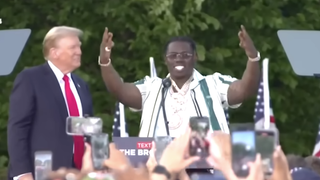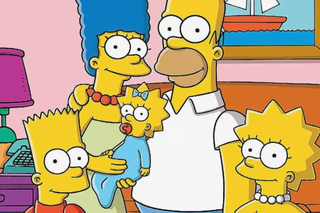Jailed Atlanta rapper Young Thug received support from an unlikely source this year – former US president Donald Trump.
In an interview in August, Trump said Young Thug was being treated “very unfair” by the prosecution in Fulton County, Atlanta, where the rapper is on trial for allegedly running a violent street gang.
Trump has his own legal troubles in Fulton County. In a case brought by the same district attorney prosecuting Young Thug’s case, Trump was indicted last year for trying to overturn Georgia’s 2020 election result. The now notorious mugshot of Trump was taken at Fulton County Jail, where Young Thug, also known as Jeffery Williams, is on remand.
To fight his charges, Trump picked Atlanta lawyer Steven Sadow, a minor legend in Atlanta’s hip-hop community. Famous for his trademark cowboy boots, Sadow has helped a roster of hip-hop artists – including Gunna, T.I. and Ty Dolla Sign – beat criminal charges.
Trump’s ability to dodge multiple convictions and survive attempts on his life, as well as his record of pardoning rappers when he was president, have earned him respect from some notable hip-hop artists, including 50 Cent, Snoop Dog and Lil Wayne.
The Trump campaign hopes this support will pay off in Georgia, one of several critical swing states that will decide the election and where nearly a third of the population – more than 3.3 million people – is black.
While Republicans had a long winning streak in Georgia – with George W. Bush taking it in 2004; John McCain in 2008; and Mitt Romney in 2012 – the growth of urban Atlanta in recent decades and the success of voter-turnout drives among minorities has made the state competitive for Democrats. After winning Georgia in 2016 by 211,000 votes, Trump lost the state by only 12,000 votes in 2020, a mere 0.23 per cent of the overall count.
With the election race again on a knife’s edge, even the slightest change in voter turnout on November 5 could prove decisive. This has put Georgia’s black community on the radar of the Trump and Harris campaigns, and specifically black men, who have emerged as swing voters in a swing state.
Vice President Kamala Harris, the first black woman running for the White House, is still set to win an overwhelming majority of the black vote both nationally and in Georgia. However, a swing of 1 or 2 percentage points in Georgia – a state with more than 1.5 million black men – could tip it in Trump’s favour.
Democrats have long dominated the black vote: Barack Obama won it by 95 per cent nationally in 2008, and Joe Biden won 92 per cent in 2020, according to the Pew Research Center.
Yet since 2016, this hold has been slipping, with Trump steadily making small gains in the community. A New York Times/Siena poll released this month shows Harris with only 78 per cent support among likely black voters and Trump at 15 per cent.
The difference is more pronounced on gender lines, with 20 per cent of black men supporting Trump and 83 per cent of black women supporting Harris.
The polls have set off alarm bells for the Harris campaign, sending it scrambling to reach black men.
At the Black Entertainment Television Hip Hop Awards last week, Harris made a pitch to young black voters in a pre-recorded interview with rappers Fat Joe and Too Short. She has also sat for interviews with black radio host and TV star Charlamagne tha God and former NBA players Stephen Jackson and Matt Barnes, who host podcast All the Smoke. Last week, the Harris campaign also released policies targeting black men.
Whether it is too little, too late, remains to be seen. Commentators opine that Harris’ turn as a tough-on-crime prosecutor may be an issue for some black men. Others point to kitchen-table issues like inflation and Trump’s economic record as holding sway.
All of these were this month dismissed as “excuses” by Obama, who tacitly accused black men of sexism for their lack of enthusiasm for Harris.
“Part of it makes me think … you just aren’t feeling the idea of having a woman as president, and you’re coming up with other alternatives or other reasons for that,” Obama said. “You’re thinking about sitting out, or even supporting somebody who has a history of denigrating you.”
The idea of blacks voting for Trump is anathema to many Democrats, who point to his racist rhetoric about Haitians and Mexicans and his checkered history with New York’s black community. This dates to 1989 when Trump took out newspaper ads calling for the death penalty of the Central Park Five, a group of black and Hispanic teens who were wrongfully convicted of the rape and assault of a white woman in Central Park.
However, this history may not matter as much to younger black men, with a September poll by the National Association for the Advancement of Colored People showing that one in four black men under 50 support Trump.
While Harris’ campaigning has targeted black women, with events at various elite black sororities, Trump has doubled down on trying to reach young black men, inviting black and Latino rappers to his MAGA rallies. These include having Sheff G and Sleepy Hallow, two rappers facing felony charges in New York, at a rally in the Bronx in May.
Trump has also engaged influencers like 24-year-old Adin Ross, who asked Trump in August about Young Thug’s trial, which is streaming live across Georgia right now.
“I heard the name. I heard it from other people that he’s being treated unfairly. So, he’s got to be treated fairly,” said Trump, who with seven days until the election, has also yet to beat the rap.









